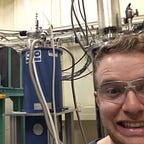The kernel of truth
We often hear it said that “everything works somewhere”. But I think this way of thinking can lead us to be a bit complacent and lazy. Discussions shouldn’t end with “well everything works somewhere”, we should be looking to find the deeper truth that is being exploited.
Having the idea that there is a kernel of truth in everything has meant that I’ve been able to be more charitable when reading things I disagree with and that I’m working positively to hunt it down rather than dismissing things.
Here are some examples:
VAK – the initial studies on VAK concluded that some tasks were inherently visual/auditory/kinaesthetic in nature and hence some people do better than others without much training – these are called modality strengths. An auditory example would be picking out random people’s voices – some people are better at this than others. The is one of the kernels of truth in VAK – some tasks DO suit certain people better (because the task matches their strength), but that doesn’t mean you can teach history through “auditory learning” because history itself isn’t inherently auditory in nature. The second kernel of truth about VAK to me is that variety is important and useful. The variety doesn’t have to be “have an visual/auditory/kinaesthetic task for students to do” but a variety of tasks will allow students to see topics from multiple angles (I think there’s some research about multiple modalities being advantageous).
Ebbinghaus’s forgetting curve – this can be dismissed as “well it’s a study of one guy learning nonsense syllables” but the kernel of truth is that forgetting happens no matter what the content and we need to work to counteract it. Hence we do retrieval practice (which I could do as it’s own section too because there’s a deeper kernel of truth to retrieval practice that definitely isn’t “do 5 random questions at the start of the lesson”.
Discovery learning – pretty conclusive that this is bad for novices, but the kernel of truth is that if students have the required knowledge, then discovery can be effective.
Restorative behaviour systems – lots of people hate/love these (for a variety of reasons) but the kernel of truth is that students need to be involved in improving their behaviour.
Metacognition – this has the downside of having a pretty woolly name from the outside. But alongside things like “learning to learn”, the kernel of truth is that it helps the motivation of students to think about how to improve their learning and be better students.
(This is the quick list I came up with in the moment that I might add to over time. I don’t agree with or disagree with any of the ideas above, but think it’s worth spending more time thinking about what they’re each trying to say).
The reason I’m writing about this today is that we are often told to read critically and avoid lethal mutations. I do agree with this. But I often find it to be quite inhibitory advice. Because it can lead us to say things like “We won’t do this because it was done in a lab study” or “this only worked because it was a primary school”.
By trying to find the kernel of truth in ideas, I’ve often found common themes across different blogs/articles/books/research that give me more confidence in the underlying kernel of truth. I’m very happy to do away with the layers that people have added to this kernel (or the fancy names we sometimes give stuff – says the guy trying to coin “kernel of truth”) because it’s the deeper thing that we want to try and implement and get right in our schools.
